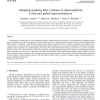Free Online Productivity Tools
i2Speak
i2Symbol
i2OCR
iTex2Img
iWeb2Print
iWeb2Shot
i2Type
iPdf2Split
iPdf2Merge
i2Bopomofo
i2Arabic
i2Style
i2Image
i2PDF
iLatex2Rtf
Sci2ools
SPEECH
2008
2008
Adapting speaking after evidence of misrecognition: Local and global hyperarticulation
In this paper we examine the two-way relationship between hyperarticulation and evidence of misrecognition of computer-directed speech. We report the results of an experiment in which speakers spoke to a simulated speech recognizer and received text feedback about what had been ``recognized''. At pre-determined points in the dialog, recognition errors were staged, and speakers made repairs. Each repair utterance was paired with the utterance preceding the staged recognition error and coded for adaptations associated with hyperarticulate speech: speaking rate and phonetically clear speech. Our results demonstrate that hyperarticulation is a targeted and flexible adaptation rather than a generalized and stable mode of speaking. Hyperarticulation increases after evidence of misrecognition and then decays gradually over several turns in the absence of further misrecognitions. When repairing misrecognized speech, speakers are more likely to clearly articulate constituents that we...
| Added | 15 Dec 2010 |
| Updated | 15 Dec 2010 |
| Type | Journal |
| Year | 2008 |
| Where | SPEECH |
| Authors | Amanda Stent, Marie K. Huffman, Susan E. Brennan |
Comments (0)

